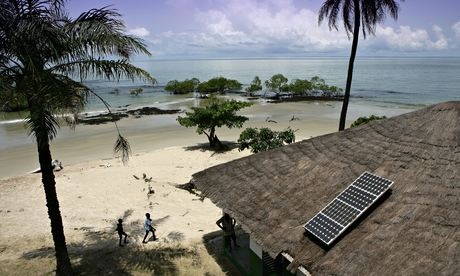Sub-Saharan Africa's lack of electricity is hindering development but this can be reversed if countries turn to ambitious, large-scale renewable energy projects, an environmental thinktank suggests.
The region – home to 41% of the world's energy-poor people, with 65% of primary schools and 30% of health centres having no access to electricity – faces an energy crisis that development models are not addressing, according to a report by the Green Alliance.
"Even with robust economic growth, [the region's] existing energy infrastructure is a brake on progress. With population growth continuing to outstrip electrification, the number of people without energy access is only projected to grow," say the authors. "This has significant implications for development, with impacts on health, education and household economy. Disproportionate amounts of time and income are spent securing energy by other means, such as gathering wood, which also has detrimental impacts on the natural environment.
"Low carbon, decentralised energy can reach communities much faster than expanding existing, inefficient central grid systems. And it offers immediate improvements to people's lives. Projections for achieving universal energy access in sub-Saharan Africa acknowledge this potential and assume that just over half the provision will need to be mini and off-grid solutions. Such options will also be more resilient in the face of climate changes."
The study was launched as the Labour party pledged to back clean power for Africa. Chuka Umunna MP, the shadow business secretary, said: "The green economy presents huge opportunities for dynamic and innovative British businesses to export overseas and increase energy access in regions such as sub-Saharan Africa through renewable technology. We are clear that Britain must be a world leader in the low-carbon economy. This is key to growing the high-skilled, better-paid jobs we need as well as powering development across the globe that benefits all.
"Yes, there is still poverty, disease and conflict in Africa. But the fact is that in the last 15 years, the African continent has been fired by the spirit of progress. We can see it in the technology hubs of Lagos and Nairobi, the successes in fighting diseases, the number of kids going to school, the burgeoning, emerging middle classes. Consider Nigeria, with its population of 170 million. It currently has the same grid power as Bradford – a city of half a million people. As Nigeria makes those investments, there will be lots of opportunities for British businesses. So we need to wake up to what is happening in Africa."
He called on African and British cities to share technology and ideas. "We must do much more throughout the country to build cultural and economic links between our cities and those in developing countries. By 2030, 50% of all Africans will live in cities. Twinned cities helped repair and build the fabric of European co-operation after it was ripped apart by the second world war. Now we must reinvent city partnerships for the new era of smart cities – between cities here and the engines of Africa's future growth.
"With our vibrant diaspora communities, we should be building on that strength to create lasting bonds that benefit our mutual futures – not weakening those bonds by distancing ourselves from the world, whether it's through EU exit or pushing away students who want to learn here."
According to the Green Alliance, off-grid solar photovoltaic has given 2.5m Kenyan households access to energy. Children study for an extra hour on average each day with solar lights, and households save 12.6% of their income and improve their health by switching from kerosene lamps to solar.
"If sub-Saharan Africa is to meet the UN's goal of universal energy access by 2030, over half its new capacity will have to be decentralised. Renewable technology has less than half the operating costs of traditional diesel generators and can make a significant contribution to climate change mitigation, at the same time as providing affordable and equitable energy access for millions of people," say the report's authors.
Laura Taylor, head of advocacy at Christian Aid, said: "Sub-Saharan Africa suffers from an acute energy crisis, with 70% of the population lacking access to electricity. Low-carbon, off-grid energy can address this faster and cheaper than high-carbon options – alleviating poverty in the process. This approach also provides an important opportunity for British businesses, which are well placed to provide low-carbon solutions and help Africa's emergent green economy to grow."
